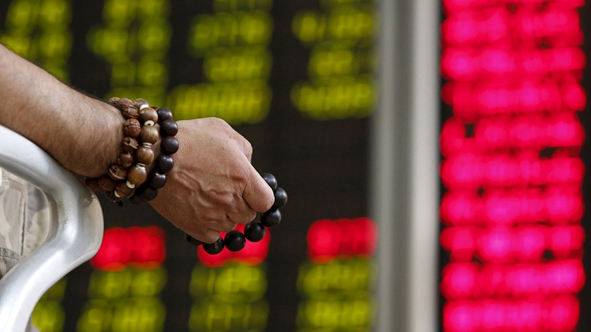
January 08, 2015

China trading halted early again, Asian markets slide in response
Chinese stocks dive more than 7%, as yuan further devalued
A plunge in China stocks led to their second trading halt this week, sending markets across the region sharply lower, as the yuan rapidly weakened.
01-07-2016
By Chao Deng

A plunge in China stocks led to their second trading halt this week, sending markets across the region sharply lower, as the yuan rapidly weakened.
The CSI 300, a benchmark of blue chips in Shanghai and Shenzhen, fell 7%, which triggered a newly launched circuit breaker that froze trading for the day. That followed a 15-minute halt after falling 5% earlier in the morning. Chinese markets usually close at 3 p.m. local time.
The Shanghai Composite Index fell 7.3% when trading halted, bringing its losses over just four trading days to 12%. That’s the largest weekly loss since the week that ended Aug. 21 .
Stock markets fell across the region: Hong Kong’s Hang Seng Index was down 2.4% and the Nikkei Stock Average was down 1.8%.Australia’s S&P/ASX 200 fell 1.4% and South Korea’s Kospi fell 1%.
Earlier, China’s central bank continued to fix the onshore yuan’s value lower to the U.S. dollar, at 6.5646, down 0.51% from Wednesday’s level, the biggest move since Aug. 13, after the yuan’s devaluation.
The onshore Chinese yuan broke to a fresh low since 2011 of 6.5920 to one U.S. dollar. It last traded at 6.5920 compared with 6.5555 Wednesday.
The offshore Chinese yuan, which trades freely, sank to a fresh five-year low, at 6.7511 to one U.S. dollar. It was last at 6.6943 compared with 6.6927 Wednesday.
The volatility recalls last summer, when China’s stock market crash and a surprise devaluation of the yuan by Beijing sparked a global rout, and wiped out trillions of U.S. dollars in value from Chinese equities.
“It’s difficult to predict what the authorities want to do,” said Arthur Lau, managing director of Asian fixed income at Pinebridge Capital.
The losses follow declines overnight globally. U.S. crude oil slumped to its lowest level since December 2008, down 5.6% to $33.97 a barrel , and the Dow Jones Industrial Average declined 1.5%.
“People are pessimistic and bracing for a global selloff,” said Mohit Bajaj, managing director at WallachBeth Capital LLC. “Emerging market currencies are weak, commodities are low” and “in combination with North Korea it’s creating a kind of ripple effect” he said.
On Wednesday, North Korea said it successfully staged its first test of a more powerful form of nuclear weapon. A flare-up in tensions between Saudi Arabia and Iran added to the geopolitical concerns.
Brent crude oil was last down 2.1% at $33.52 a barrel.
Gold prices were up 0.4% at $1,096.40 a troy ounce.
Click Link:
http://www.marketwatch.com/story/china-trading-halted-early-again-asian-markets-slide-in-response-2016-01-06







